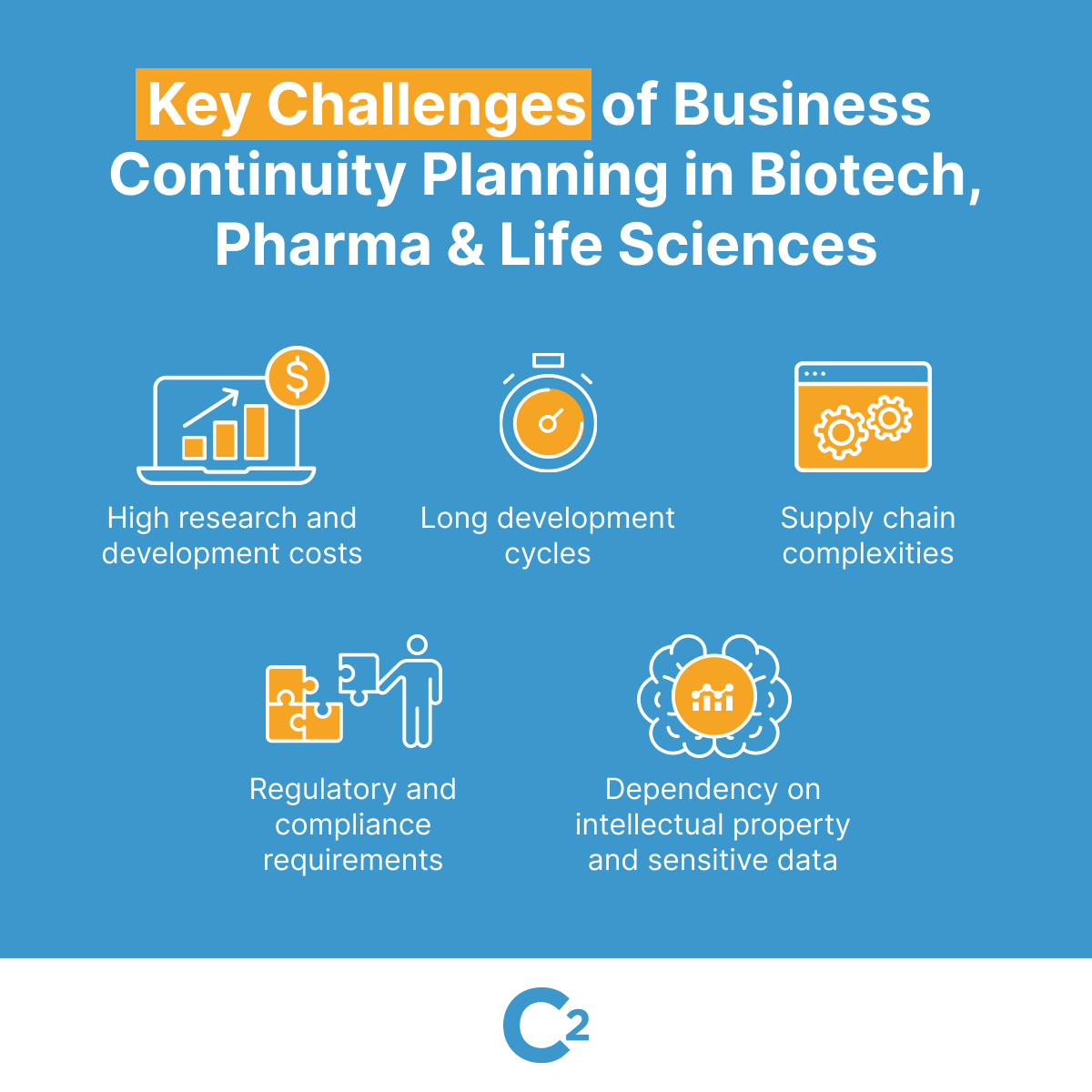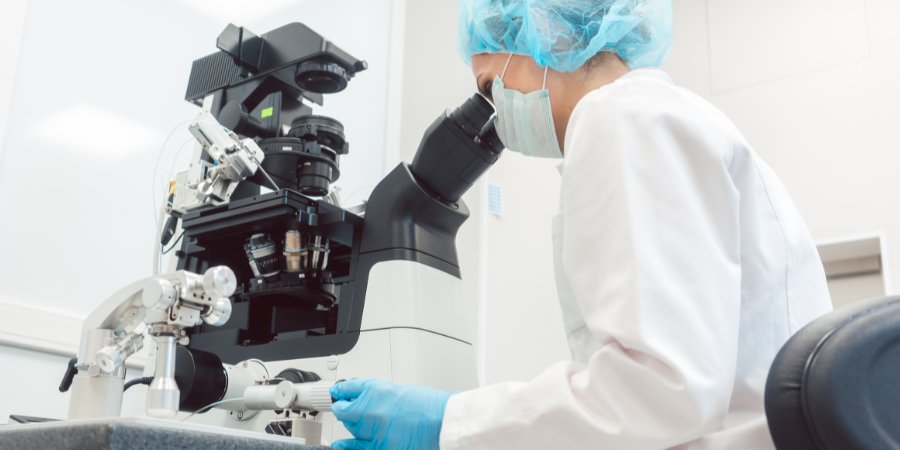Jump to a section
The biotech and life sciences industry is responsible for many of the breakthroughs we have seen in medicine in the past, most notably in the rapid response to COVID-19 and the creation of vaccines to fight against the virus. In an industry such as this where time is very much of the essence, business continuity planning (BCP) forms a vital line of defence to help keep things on track.
When disaster strikes, businesses across all industries should have reliable and tested plans in place that they can use to mitigate the impact of the issue and ensure operational resilience. Biotech companies may hold sensitive data or unique developments that are yet to be patented. The disruption of these business processes can have devastating effects. A comprehensive BCP approach ensures regulatory requirements are met and that leaders have everything they need to know in order to resume normal operations.

5 unique challenges facing the biotech, pharma, and life sciences industry
The biotech industry faces many unique challenges that must be accounted for and mitigated if true business continuity and resilience are to be achieved. These typically include:
1. High research and development costs
Development in the biotech markets can be incredibly expensive. Researchers require high salaries to match their expertise, specialized equipment can be expensive to acquire, and funding can be difficult to secure for more obscure projects.
2. Long development cycles
Research in the biomedical spheres takes time. In addition to developing products, they often have to go through long trials to prove that they are effective and that they meet regulatory guidelines.
The pharma industry is also affected by this. The U.S Food & Drug Administration (FDA) can take up to ten months to approve a new drug, and that is just the approval cycle. In-house development can take years if not decades to fully develop and test.
3. Regulatory and compliance requirements
The U.S. Coordinated Framework for the Regulation of Biotechnology outlines the Federal regulatory policy for the biotech industry. The policy is jointly managed by the FDA, the U.S. Department of Agriculture (USDA), and the U.S. Environmental Protection Agency (EPA).
Due to the complex licensing and regulation of this industry, operations may frequently only take place in specified accredited and licensed laboratories. Setting up alternative or temporary locations may not be feasible.
The FDA also regulates the pharma industry, with current regulatory standards being outlined by the Current Good Manufacturing Practice (CGMP).
4. Dependency on intellectual property and sensitive data
Intellectual property and sensitive data pose a substantial risk due to the potential for theft, loss, or unauthorized access. Breaches may lead to financial and reputational losses and regulatory penalties. Such data could include proprietary research, patents, clinical trial research, and genetic material from patients, research subjects, and control samples.
5. Supply chain complexities
The pharma and biotech industry frequently needs to source specialized materials and equipment at a high price. So unique is this equipment that it may only be available from one specific vendor.
Genetic samples and other materials also need to be handled in very specific conditions. This includes ensuring sterile environments and ambient temperatures across shipping and delivery, not just use in the lab.

How to facilitate business continuity in the biotech industry
Any business continuity plan requires careful planning and preparation to ensure all critical functions and risks are correctly identified, assessed, and addressed. When facilitating business continuity management and creating disaster recovery plans, companies should undertake the following processes:
Risk Assessment and Management
Risk assessment and management are key parts of business continuity planning in many industries, but many risks pose unique and specific threats to biotech. Any risk assessment plan needs to accurately identify and categorize such risks.
Risks that could affect the biotech and life science industries could include:
- Cyber threats
- Equipment failure
- Drug shortages
- Regulatory changes
Business Impact Analysis (BIA)
Business Impact Analysis (BIA) is a critical part of the business plan designed to assess and address the potential impacts of disruptions on business operations. From there, an adequate plan to mitigate and respond to these events and impacts can be created.
Typical business impacts that can arise in the biotech world include:
- Delays in research progress
- Denial of access to key information systems
- Disruptions to supply chains
- Manufacturing disruptions
- Distribution issues
- Natural disasters impeding access to work facilities

Implementing business continuity strategies
Once the BIA and risk management plans have been created, teams need to create and implement business continuity strategies to cover the areas that could cause the biggest disruption. These can include:
- Data protection – Creating robust strategies to protect sensitive research data, procedures, and intellectual property.
- Cybersecurity – Implementing strong protocols for employees to follow to actively protect and fight against malicious attacks and data breaches.
- Operational resilience – Building resilient operational processes to handle disruptions and streamline recovery, with measures including alternative lab locations, supply chain diversification, and more.
- Regulatory compliance – Ensuring continuity plans comply with industry regulations and standards and that biotech firms are aware of any upcoming changes to the industry well in advance of deadlines.
Enhance business continuity in biotech with Continuity2
Conducting risk assessments and actively engaging in business continuity planning in an industry like biotech comes with many nuances, all of which need to be accounted for.
Continuity2's Meridian BCMS is designed to intuitively encompass all aspects of business continuity management from initial analysis through to active safeguarding and crisis management. The platform is fully customizable to allow businesses to both create an interface that acts seamlessly with their existing company platforms and effectively meet the needs and criteria of their business continuity plan.
Whether a company needs to create a new BIA or promptly respond to an incident, C2 is ready to facilitate any and all operations organizations may require. Our software is fully compliant with ISO 22301 and ISO 27001 so you can be assured that your business continuity is in safe hands with us.
Protect your biotech operations and organization with C2
The pharma and biotech industry plays an important role in our modern world but with that comes responsibilities and the demands placed upon companies by regulatory bodies. An essential part of the life science industries will always be compliance and business continuity planning serves an important role in this.
By investing in a robust business continuity plan, biotech companies can ensure that they proactively address threats and changes within their industry. Reacting retrospectively can leave organizations open to big financial impact, damage to reputation, and the loss of key contracts.
Continuity2 delivers cutting-edge solutions to aid your business goals even when disaster strikes. Trust us to keep your biotech operations on track, compliant, and always up-to-date. Notify suppliers and key employees in the event of the unforeseen, and keep all data regarding your compliance efforts in one easy-to-use location.
Get in touch with us and book a demo to find out more about how C2 can help transform your approach to business continuity and operational resilience.
Written by Richard McGlave
Founder & CEO at Continuity2
With over 30 years of experience as a Business Continuity and Resilience Practitioner, Richard knows the discipline like the back of his hand, and even helped standardise BS25999 and ISO 22301. Richard also specialises in the lean implementation of Business Continuity, IT Service Continuity and Security Management Systems for over 70 organisations worldwide.


Written by Richard McGlave
Founder & CEO at Continuity2
With over 30 years of experience as a Business Continuity and Resilience Practitioner, Richard knows the discipline like the back of his hand, and even helped standardise BS25999 and ISO 22301. Richard also specialises in the lean implementation of Business Continuity, IT Service Continuity and Security Management Systems for over 70 organisations worldwide.